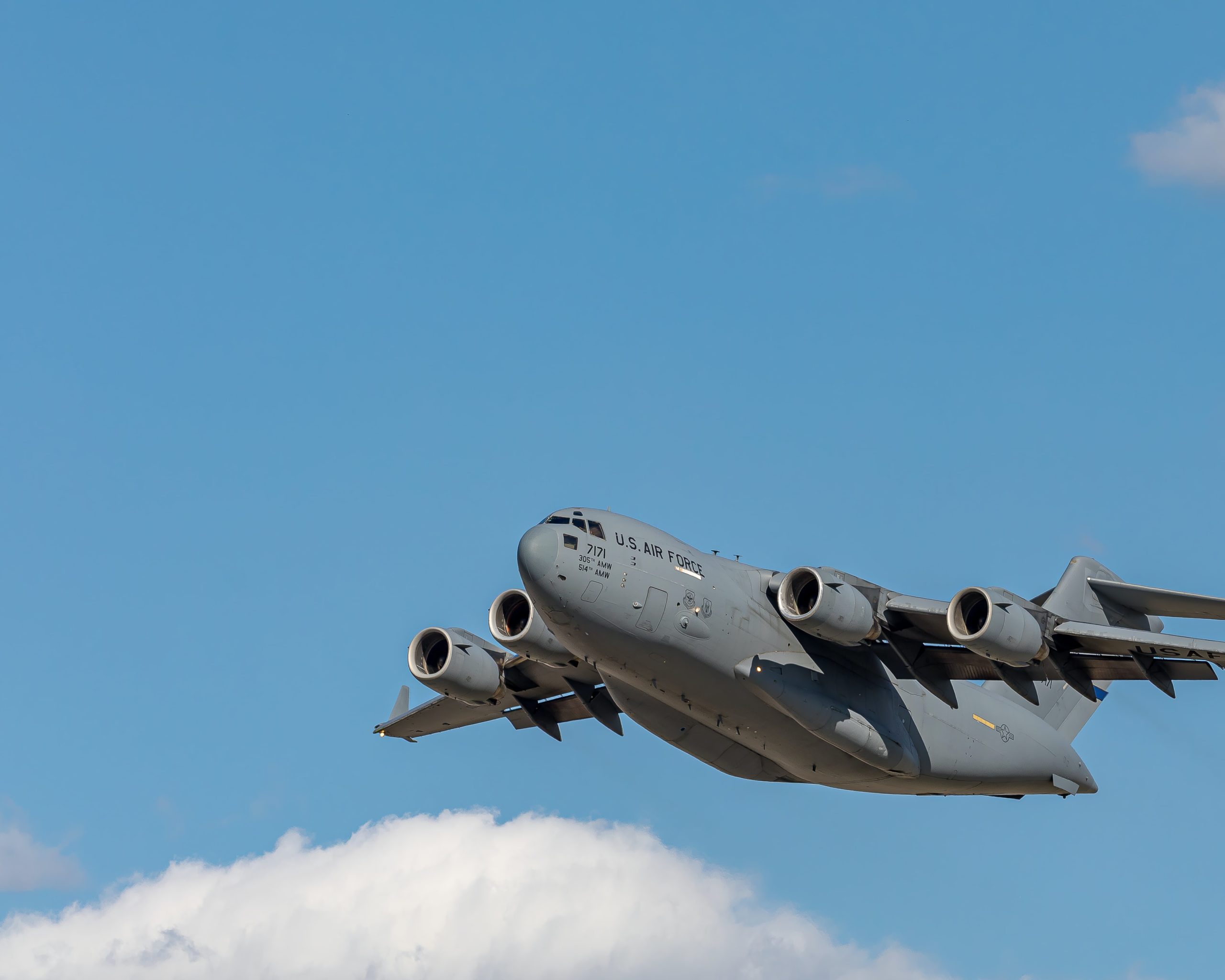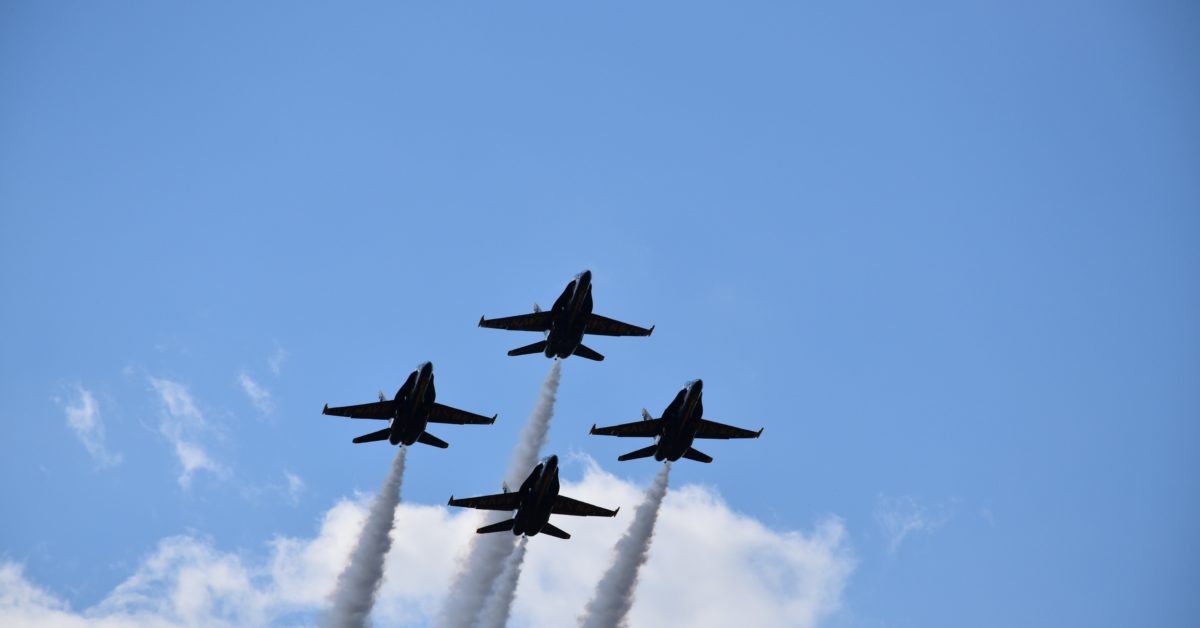Whether you’re a brand-new civil engineer who is just out of school or a seasoned professional with years of experience in the field, you may be wondering about the job opportunities available to you. As a field with many diverse applications, civil engineering can lead to a variety of different career options.
One of those options is working with the United States air force. The air service branch of the United States armed forces, the air force is one of the country’s eight uniformed services. Working with the air force can provide a meaningful, impactful career with an attractive salary and competitive benefits. Plus, you’ll be serving your country.
In this article, we’ll answer all of the questions you may have about working as a civil engineer for the U.S. air force. We’ll cover benefits, minimum requirements, salary, rank, and more. If you’re considering a career as an air force civil engineer, read on.

via Unsplash
Does the Air Force Hire Civil Engineers?
Yes, the air force does hire civil engineers. They know how important it is to ensure that air force buildings and structures are properly maintained and combat-ready. Civil engineers who work with the air force are responsible for imagining and implementing solutions to complex problems in order to keep air force facilities and utilities running effectively.
Working as a civil engineer with the air force will expose you to a variety of different complex tasks and projects. Highly trained air force civil engineers provide necessary problem-solving skills and expertise to thousands of structures and projects across the globe.
Can a Civil Engineer Become a Military Engineer?
Normally, the air force hires its civil engineers as civilian employees so you’ll need to complete some additional requirements if you’re looking to raise your status to that of a military engineer. In the next section, we’ve listed all of the requirements for a civil engineer who is a civilian employee to become a military engineer.
What are the Minimum Requirements of a Civil Engineer in the Air Force?
The minimum requirements of a civil engineer in the air force include educational requirements as well as general qualifications. In terms of education, the air force requires that civil engineers hold a bachelor’s degree in architecture or civil, electrical, environmental, construction, architectural, industrial, or mechanical engineering.
The air force will also accept degrees in biomedicine, chemical engineering, petroleum engineering, aerospace engineering, or construction management. If you’re considering one of these degrees, it may help to take a look at this list of top civil engineering schools.
In addition to these educational requirements, the air force also has a number of general requirements, which are as follows:
- Knowledge of contingency engineering, construction, repair management, and protection and prevention procedures
- Completion of necessary Air Force Institute of Technology courses
- Minimum of 12 months of experience in a subspecialty field
- Normal color vision and depth perception
- Minimum height of 4 feet, 10 inches and a maximum height of 6 feet, 8 inches
- No record of claustrophobia
- Ability to pass air force physical
- No record of emotional instability
- Successful completion of Single Scope Background Investigation (SSBI)
- Completion of Officer Training School (OTS), Air Force Academy (AFA), or Air Force Reserve Officer Training Corps (AFROTC)
- Age between 18 and 39
It’s important to note that if you’re working as a civilian employee with the air force, like most civil engineers, you will not need to complete OTS, AFA, or AFROTC. Most of these requirements apply to only military engineers, not civilian employees working in the civil engineering role.
What are the Benefits of a Civil Engineer in the Air Force?
The benefits of a civil engineer in the air force include a competitive salary, a flexible work schedule, continuous learning opportunities, and career advancement. The plan options and benefits rival (and sometimes even exceed) those offered in the private sector. The suite of federal benefits you’ll get is unparalleled.
The federal benefits offered include:
- Flexible work schedule to help you balance time between work and family
- Telecommuting (employees in certain positions can work from home)
- Comprehensive health coverage
- Dental and vision coverage
- Flexible health savings account (HSA) that allows you to spend pretax dollars on healthcare expenses
- Long-term care insurance
- Life insurance
- Retirement plan (a transferable 401(k) with generous matching contributions)
- Paid time off up to 30 days per year
The air force is proud of the benefits that it offers its members and civilian employees. That’s why these benefits stand out as some of the best around and are comparable to even the
best benefits offered in the private sector.
 via Unsplash
via Unsplash
What Does a Civil Engineer Do in the Air Force?
Some of the tasks an air force civil engineer might be involved in include drafting, surveying, planning, and even explosive ordnance disposal and disaster preparedness. The air force lists further career tasks as follows:
- Support combat operations and activities
- Maintain emergency response force to cope with enemy attacks, major accidents, and natural disasters
- Determine requirements and direct operations and repairs of facility and utility systems
- Dispose of conventional, nuclear, and chemical biological weapons
- Master drafting, surveying, and construction management
- Assess damage and perform necessary repairs
No matter what specific project you’re taking on, it’s clear that working with the air force will expose you to a variety of interesting and complex projects and tasks. Civil engineers who work with the U.S. air force are sure to gain a broad range of experience.
Where Do Air Force Civil Engineers Get Stationed?
The air force has civilian employees who are working as civil engineers and are stationed at a number of different locations across the United States. Often, these individuals report to work at different air force bases within America. For example, Camp Perry, in Ohio, has a number of civilian employees who are civil engineers for the air force.
When you apply for a job with the air force as a civil engineer, you should consider whether or not there is a nearby base that you would be able to easily report to. If there is not, you should consider whether or not you would be willing to relocate for the position. Most air force civil engineers do have to report to work in person rather than working from home.
The air force also maintains several civil engineering units, called United States Air Force Civil Engineering Squadrons. These units are made up of military engineers who have met the requirements that we covered above.
In wartime, these squadrons provide rapid repair service to damaged airfields and other critical facilities. In peacetime, they work on maintaining and constructing bases for the air force to operate from.
Internationally, there are air force civil engineering squadrons stationed in Qatar and Guam (which is actually an unincorporated territory of the United States). Within the continental United States, there are civil engineers stationed in Ohio, Pennsylvania, Florida, Virginia, Montana, Louisiana, Nevada, South Carolina, and North Carolina.
How Much Do Civilian Air Force Engineers Make?
Civilian air force engineers make salaries ranging from $78,917 per year to $115,759 per year. The exact pay that each engineer receives will depend upon the level of seniority as well as specific job duties. The average salary for an air force civilian engineer is $99,995.
Air force civilian engineers in executive positions will be paid according to the government’s executive pay schedule. This schedule includes five pay levels that run from $165,300 (Level 5) to $226,300 (Level 1). Air force executive schedule civilian civil engineers earning at the Level 1 scale are very rare.
What Rank are Air Force Engineers?
When you first join the air force as a civil engineer, your rank will be an E-1 airman basic. By completing some requirements in advance, however, you can start your career in the air force at the rank of airman first class (also known as E-3). The highest-ranking air force civil engineer is a major general. It is the two-star general officer rank of the U.S. air force, and ranks just above brigadier general and just below lieutenant general.
There are other awards that may also be offered to accomplished civil engineers that go beyond rank. For example, after 15 years of service, officers who have performed at the craftsman skill level for at least five years can be awarded a special badge for being a master civil engineer.

via Pexels
Final Thoughts
Civil engineers are responsible for a whole host of the world’s modern infrastructure and building projects. For many civil engineers, whether you’re new to the field or you’ve been working in it for years, public sector employment opportunities are quite attractive.
Working for the United States air force is one of many meaningful career options for civil engineers. The U.S. air force works with both enlisted civil engineering officers and non-enlisted civilian employees. The right option for you depends on your long-term goals, your commitment to the military, and many other considerations outlined in this article.
No matter what opportunity you choose, there are plenty of civil engineering projects—like those that Fenstermaker takes on—and job opportunities out there. Civil engineering remains a growing industry, and positions are competitively paid and highly in demand.





